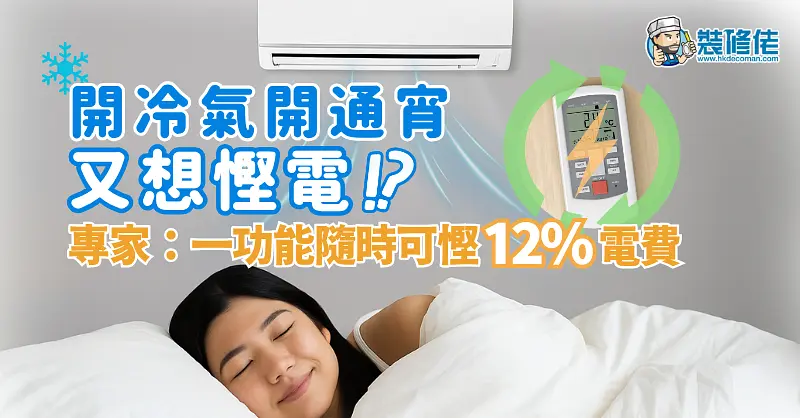Beat Hong Kong's Heat: Save on AC Bills
Listen to the blog audio:

The summer in Hong Kong is unbearably hot, making it hard for many to sleep at night without turning on the air conditioning. However, leaving it on all night until dawn can add up to a considerable amount on your electricity bill. According to last year's test by the Consumer Council, taking a one-horsepower inverter window air conditioner as an example, cooling for 180 days a year, 12 hours a day, at a rate of $1.6 per kWh, the electricity bill could be as high as HKD 1,029, with the lowest being HKD 763. How can you enjoy the coolness while saving on electricity? Let Renovation Man teach you about three 'air conditioning modes' and share practical energy-saving tips to keep your summer cool and your wallet happy!
Sleep Mode: The Secret Weapon for Saving Electricity at Night
The "Sleep Mode" of air conditioners can be considered a secret trick for saving electricity, especially suitable for nighttime use. After activation, the air conditioner will gradually increase the temperature by 1 to 2 degrees within the first two hours after you fall asleep, for example, from 26 degrees to 28 degrees. According to data from the Taiwan Ministry of Economic Affairs' Energy Administration, each degree increase can save about 6% on electricity bills, and 2 degrees can save 12%. If you use the air conditioner for 8 hours every night, you can save a considerable amount on electricity bills over a month.
In addition, the sleep mode automatically reduces the fan speed, decreasing operational noise and air flow, allowing you to sleep more comfortably and avoid waking up in the middle of the night due to excessive cold. Decoration Academy Principal Simon suggests that before going to bed, you can first set the air conditioner to strong wind cooling mode, and then switch to sleep mode after the room becomes cool, ensuring both electricity saving and comfort.
Energy Saving Mode: Inverter Air Conditioner's Power Saving Assistant
Besides the sleep mode, the "Energy Saving Mode" of inverter air conditioners is also a good choice for saving electricity. The energy saving mode maintains a stable room temperature through the low-frequency operation of the compressor, which is more energy-efficient compared to fixed-frequency air conditioners. However, experts remind that if a fixed-frequency air conditioner uses the energy-saving mode, it may increase power consumption due to the frequent start and stop of the compressor. Therefore, purchasing an inverter air conditioner can better utilize the advantages of the energy-saving mode.
It is worth noting that the sleep mode and the energy-saving mode should not be turned on at the same time, otherwise, it may offset the power-saving effect. According to the usage scenario, such as nighttime rest or short-term use during the day, choosing the appropriate mode can maximize the energy-saving effect.

Dehumidification Mode: The Hidden Trap of Doubling Electricity Bills
Many Hong Kong residents are accustomed to turning on the "dehumidification mode" of their air conditioners during humid weather, thinking it makes the indoors drier. However, Taiwan's Energy Agency points out that the power consumption of an air conditioner's dehumidification mode is twice that of a standalone dehumidifier! In fact, air conditioners already have a certain dehumidification function when cooling, and additionally turning on the dehumidification mode not only has limited effect but also significantly increases electricity bills.
Simon explains that for humid days when strong cooling is not needed, the dehumidification mode might provide a comfortable feeling, but if the environmental humidity is insufficient or the temperature difference is not significant, the mode may not operate effectively and could instead consume more electricity. If your home frequently needs dehumidification, purchasing a dedicated dehumidifier would be more economical and environmentally friendly.
Filter Cleaning: A Simple Tip to Save 2 Degrees of Electricity Daily
Maintaining your air conditioner is crucial for energy saving. Taiwan Power Company recommends cleaning the air conditioner filter every two to three weeks, which can save about 10% of the air conditioner's electricity usage, equivalent to saving about 2 degrees of electricity daily. According to Hong Kong's electricity fee standards, this simple habit can save dozens of dollars in electricity bills every month. A clean filter not only improves the operation efficiency of the air conditioner but also enhances indoor air quality, reducing dust and allergens.
When cleaning the filter, simply rinse it gently with water and let it dry, avoiding the use of strong detergents that could damage the filter. If the air conditioner has not been cleaned for a long time, accumulated dust may lead to a decrease in cooling efficiency, requiring the compressor to run longer, thereby increasing electricity expenses invisibly.

Air Circulation: The Golden Partnership of Electric Fans and Air Conditioners
Want to further enhance the efficiency of your air conditioner? Pairing it with an electric fan is a smart method. Adjust the air conditioner's vent blades to the horizontal direction and use an electric fan to speed up indoor air circulation, allowing cool air to spread more quickly to every corner of the room. This method not only shortens the time for the air conditioner to reach the set temperature but also allows you to set the temperature 1 to 2 degrees higher, further saving on electricity bills.
For example, setting the air conditioner to 27 degrees and pairing it with an electric fan may provide a comfort level similar to 26 degrees without a fan, but the power consumption is significantly reduced, which is especially practical for small-sized homes in Hong Kong.

Smart Electricity Usage: The Wonders of Timing Function
Moreover, many new air conditioners are equipped with a timing function, allowing the setting of operation time, such as setting an 8-hour auto shutdown before sleep to avoid the air conditioner running all night. Combining sleep mode with the timing function not only ensures comfortable sleep but also effectively controls electricity expenses.
Purchasing Advice: Inverter Air Conditioners and Energy Labels
When purchasing an air conditioner, choosing one with a first-level energy label inverter air conditioner is key to saving electricity in the long run. Tests by the Consumer Council have shown that high-efficiency inverter air conditioners can save hundreds of dollars in electricity bills under the same usage conditions compared to ordinary models. In addition, when purchasing, you can check whether it has functions such as sleep mode and energy-saving mode. These designs can help users manage electricity more flexibly.
[Editor's Picks]
[Home DIY Guide] Say Goodbye to Home Leaks! Comprehensive Storm-Sealing Repair Solution
Learn more about renovation quotes for different house types for free:
Public Housing|https://decoman-publichousing.com/
Private Housing|https://decoman-privatehousing.com/
New Properties|https://decoman-newproperties.com/
Tenement Buildings|https://decoman-tenement.com/
===============================================
The content and images of this article are provided by the columnist Renovation Man.
